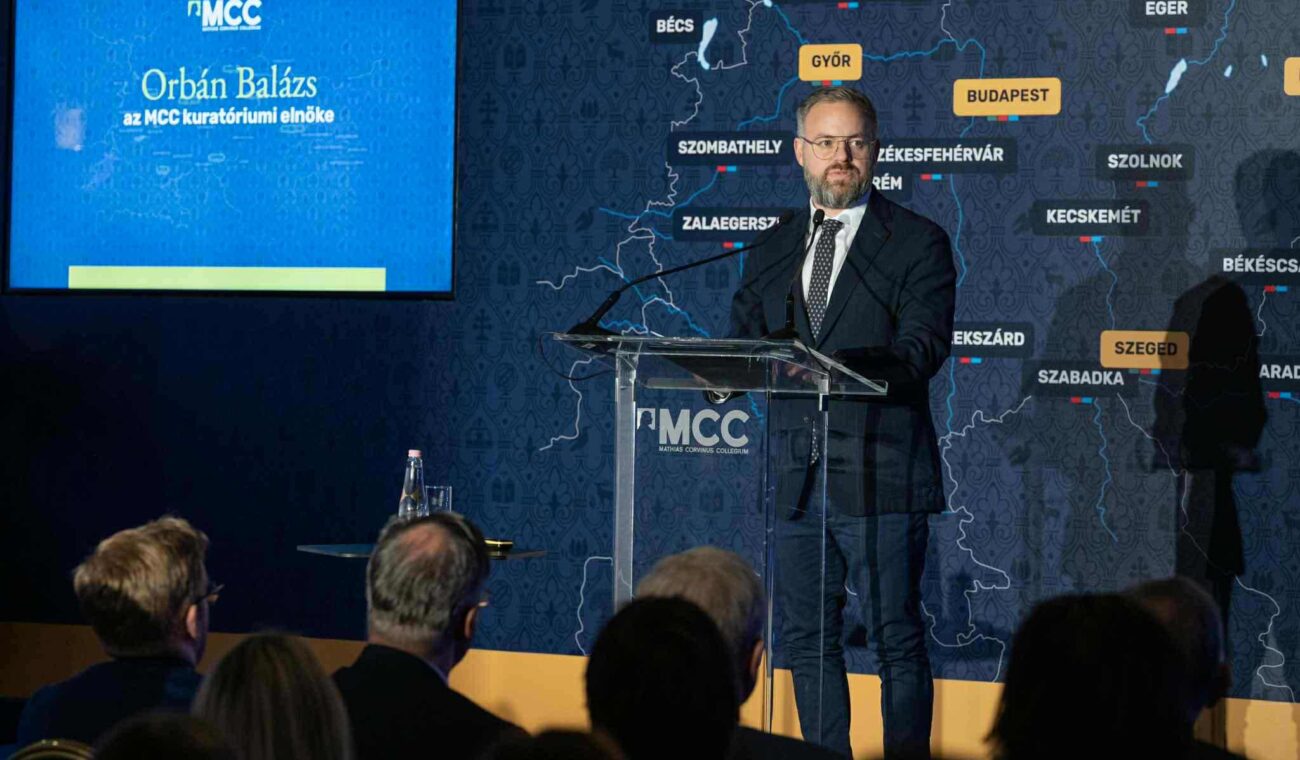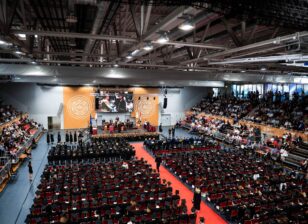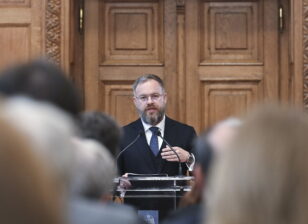MCC Annual Opening Address
MCC Annual Opening Address
2025. 09. 19.
Dear Professors! Ladies and Gentlemen! Most respected and dearest MCC community!
I would like to welcome the veteran students on board, as well! And a warm welcome to the freshmen and junior students!
It sure has been a busy couple of months. We meet again after a summer that leaves us speechless. Especially the tragic news of the past few weeks has affected us deeply, both me personally and the members of our community, who are deeply committed to education and talent development. It is not difficult to guess what I am referring to: the death of American commentator, Charlie Kirk. The violent loss of a human life is a tragedy in itself, and the grief of his family and young children who are left behind touches every decent person. But if we get past the initial shock and reflect on what happened, a very ominous picture emerges.
Charlie Kirk was 31 years old. He devoted most of his adult life to debate, and he did so in the place where this genre historically belongs to: at universities. The university has been one of the most important institutions of Western civilization ever since the Middle Ages. The university is a civilizational achievement where it is possible to transmit and receive values that cannot be found anywhere else. According to Sir Roger Scruton, the mission of universities is to provide a space for arguments and reflection aimed at truth. Therefore, there is a place for debate at the university, but there is no place for censorship, exclusion, or violence.
Charlie Kirk engaged in countless debates; open-air, campus discussions became his trademark. He took a firm stance on issues such as immigration, abortion, and gender theory. There were some issues on which one could agree with him and others on which one could not. One thing is certain, however: he was a man of constructive, productive debate. He was well aware that it has been increasingly difficult to have genuine debates at Western universities, with many institutions becoming hostage to progressive-liberal dogma. His first major initiative drew attention to the absurdities of politically biased academic practices: in response, he set up a helpline for students facing discrimination in higher education because of their specific worldview.
Dear MCC community!
Unfortunately, academic progressive dogmatism has now emerged not only in the United States, but throughout the Western world, including Hungary. Suffice it to recall the results of the Project for Transparent Education, recently presented here at MCC. I mention this also because there are first-year students here who will likely encounter this themselves. According to the research, almost half of the students surveyed, 48 percent, do not feel that they are free to express their opinions in the university environment in Hungary. A quarter of them, 25 percent, have already experienced explicit partisan political statements from their instructors. And nearly 15 percent have personally experienced or witnessed someone in their immediate environment being discriminated against because of their political views. So the situation is that we are no longer impartial, external actors in this issue.
Initially, it was the progressive side that proclaimed itself to be the antithesis of dogmatism. By comparison, the world has changed dramatically. Today, it often seems as if—to use a metaphor—the cart is put before the horse. Those who do not subscribe to the current liberal canon are liable to be excommunicated, pilloried, or even subjected to academic witch hunts. Respected professors put pressure on their colleagues to undermine the research of certain students on ideological grounds. There are many of us here even in this room who have experienced this.
This phenomenon is alarming on at least two different levels. On an individual level, because who would want to be part of an academic environment where expressing one’s opinions and values leads to stigmatization and marginalization? But maybe even more importantly, all of this is harmful on a larger scale, at the community and national levels. The strength of a nation lies in the answers it finds to the great challenges of history. And answers can only be found through open and honest discussion, through the free exchange of views. If the academic world shuts itself off ideologically and becomes a closed society, not only will universities perform worse, but we Hungarians will also perform worse in the great tests of history. The upcoming decades will put every nation to a serious test. Success will depend on what ideas and solutions we Hungarians come up with. Good solutions require courage, originality, and innovation. The idea that it is enough to simply copy what has already been invented on the other side of the world no longer works.
We must be fully aware of our own values and the interests arising from them, and we must be able to say what is good for us and what we would rather not have, thank you very much. We must learn to combine academic and scientific curiosity with representing our nation and advancing the cause of Hungary. However, this is only feasible if we can maintain intellectual freedom in the academic world and defend ourselves against the dogmatic, currently liberal-driven uniformity.
Dear Friends!
MCC was established, and its operation upgraded a few years ago, to provide a forum for high-quality, scholarly debate and dialogue that serves the nation as a whole. We believe in meaningful dialogue, the clash of opinions, and diversity. We also believe that this is the only way to find the best solutions to the problems of the Hungarian community and the Hungarian nation.
You, dear students, who are entering the academic year today, can already be proud of yourselves on an individual level. In the past few years and during the admissions process, you have proven your excellence. Many of you already have firm values and a fully formalised worldview. This is right, this is good: it is natural that you want to be successful and arrange your lives according to your own terms.
But I ask you to also think about how these values can serve something greater than yourselves. How can your talents benefit all Hungarians? I am not asking you all to embrace the same set of values – I am not asking you to rally behind a particular banner.
I am asking you not to stop at the threshold of individual happiness. Think about how you can use your values, knowledge, and talents for the benefit of the nation. MCC is a place where you will always have the opportunity to do so. Our mission is to create the intellectual platform for this, a safe environment for responsible, open debate. Your mission is to learn to articulate your views as well as possible and to learn to argue your case as well as possible.
The more successful you are at this, the greater your personal and collective success will be. I remember once a first-year student asked me during a class, “Are we really allowed to say anything here?” I replied, “Yes, you are – but then you have to be able to defend it.” And more importantly, if you couldn’t defend it, then you have to be able to admit that you were wrong. Because you are not right just because you shout louder or because you make threats with a weapon in your hand. Violence is not a position. A weapon cannot be an argument. Period.
In this spirit, I wish everyone a great academic year, lots of hard work, lots of success, and fertile debates! And I also hope that when you complete any of the MCC’s training courses, you will all have an answer to the question of how you can contribute to something greater than yourselves – the future of the Hungarian nation. With these words, I hereby officially open the 2025–2026 academic year.
Thank you for your attention!



